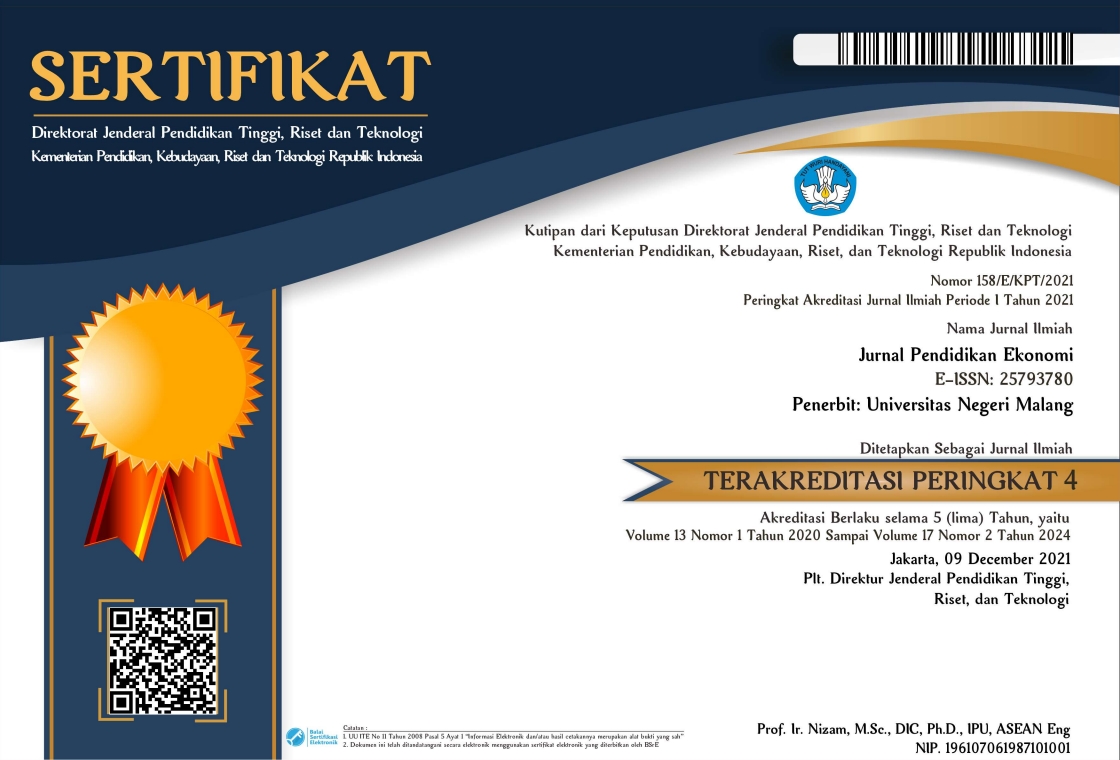PENGARUH PENGGUNAAN GADGET, MINAT BELAJAR DAN KECERDASAN EMOSIONAL TERHADAP HASIL BELAJAR SISWA KELAS XI IIS PADA MATA PELAJARAN EKONOMI DI SMAN 1 KEPANJEN
Abstract
Learning process is the most important part because it determines how well the outcomes will be achieved by students. In the Learning process, there are some factors which influence. They are internal factor, external factor and exhaustion factor. But in this research only concern on internal factors: learning interest and emotional quotient and also external factor: gadget usage. The purpose of this research is to know the effect of gadget usage, learning interest and emotional quotient partialy and simultanously towards learning outcomes. The kind of this research is explanation research with quantitative approach. Data obtained by using quistioner and documentation. Questioners are given to the research samples by using technique proportional random sampling, the amount of the samples are 97. While documentation is used to obtain data about learning outcome at Economics Subject . The result of this research shows that there are significant effects of gadget usage, learning interest and emotional quotient towards learning outcomes. Each of independent variabel has significany effect such as: the effect of gadget usage is about 10,43%, the effect of learning interest is about 27,22% and the effect of emotional quotient is about 22,75%.
DOI: https://dx.doi.org/10.17977/UM014v11i12018p009
Keywords
Full Text:
PDFReferences
Abdulhak, Ishak & Darmawan (2013) Teknologi Pendidikan. Bandung: PT. Remaja Rosdakarya.
Arifin, Syamsul (2015) The Effect of Gadget Smartphone Utility and Learning Facility on Economics Learning Achievement. (online). www.academia.edu/28680397/GADGET_SMARTPHONE. Diakses 25 September 2016.
Dalyono, M (2009) Psikologi Pendidikan. Jakarta: Rineka Cipta.
Djali (2009) Psikologi Pendidikan. Jakarta: Bumi Aksara.
Goleman, Daniel (2003) Kecerdasan Emosional, Mengapa EQ lebih penting daripada IQ. Jakarta: PT Gramedia Pustaka Utama.
Harackiewicz, Judith (2010) The Importance of Interest : The Role of Achievement Goals and Task Values in Promoting the Development of Interest. (online). (www.onlinelibrary.willey.com). Diakses pada 1 Mei 2017
Ngafifi, Muhammad (2014) Jurnal Pembangunan Pendidikan: Fondasi dan Aplikasi Volume 2, Nomor 1 Tentang Kemajuan Teknologi dan Pola Hidup Manusia dalam Perspektif Sosial Budaya. (online) .https://www.google.com/url?q=http:??journal.uny.ac.id/index.php/jppfa/article/download/2616/2171. Dikases pada 25 September 2016.
Nikmah, Astin (2013) Dampak Penggunaan Handphone Terhadap Prestasi Belajar Siswa. 2013. (online) (http://www.google.com/url?q=https://dispendik.surabaya.go.id/surabayabelajar/jurnal/199/5.7.pdf&sa) . Diakses Pada 25 September 2016.
Oetomo, Budi Sutedjo (2002) Konsep, Teknologi, dan Aplikasi Internet Pendidikan. Yogyakarta: ANDI
Rupande, Gift (2015) The Impact of Emotional Intelligence on Student Learning. (online) (http://www.arcjournals.org) Diakses Pada 1 Mei 2017
Slameto (2003) Belajar dan Faktor-Faktor yang Mempengaruhinya. Jakarta: Rineka Cipta.
Subini, Nini (2011) Mengatasi Kesulitan Belajar Pada Anak. Yogyakarta: Javalitera
Sugiyono (2007) Statistika Untuk Penelitian. Bandung: CV Alfabeta
Widarjono, Agus (2013) Ekonometrika Pengantar dan Aplikasinya. Yogyakarta: UPP STIM YKPN.
Refbacks
- There are currently no refbacks.

Jurnal Penddidikan Ekonomi is licensed under a Creative Commons Attribution-NonCommercial-ShareAlike 4.0 International License





